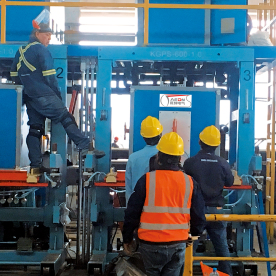****
In the ever-evolving world of manufacturing, the call for sustainability and efficiency has never been louder. The pipe manufacturing industry is no exception, as it seeks innovative solutions to reduce costs, minimize waste, and decrease energy consumption. Enter the energy-efficient pipe mill production line, a revolutionary approach that promises to transform the traditional pipe production process into a more sustainable and economically viable venture.
Understanding Energy-Efficient Pipe Mill Production Lines
An energy-efficient pipe mill production line refers to a comprehensive system designed to manufacture pipes with minimal energy consumption while maintaining high productivity and quality. This production line incorporates advanced technologies, such as automation, energy recovery systems, and efficient machinery, making it possible to produce pipes while adhering to stringent environmental standards.

Exploring the Benefits and Innovations of Energy-Efficient Pipe Mill Production Lines in Modern Manufacturing
Key Benefits of Energy-Efficient Pipe Mill Production Lines
1. **Reduced Energy Consumption**: The most significant advantage of energy-efficient pipe mill production lines is their ability to minimize energy usage. By leveraging advanced technology, manufacturers can reduce their energy needs by up to 30% compared to traditional methods. This reduction not only lowers operational costs but also diminishes the environmental impact of production processes.

Exploring the Benefits and Innovations of Energy-Efficient Pipe Mill Production Lines in Modern Manufacturing
2. **Cost Savings**: As energy costs continue to rise globally, operating costs can quickly spiral out of control for manufacturers. By implementing energy-efficient production processes, companies can realize significant savings in their energy bills. Additionally, reduced energy consumption often translates to lower emissions, potentially qualifying companies for tax credits or incentives related to sustainability.
3. **Enhanced Product Quality**: Energy-efficient pipe mill production lines often utilize state-of-the-art technology that enhances the quality of the pipes produced. Automatic monitoring systems can ensure uniformity in dimensions and material properties, leading to fewer defects and higher overall product quality. Enhanced quality not only satisfies customer requirements but also reduces waste and rework, further contributing to sustainability goals.
4. **Sustainability and Environmental Impact**: As industries face increasing scrutiny regarding their environmental footprint, implementing energy-efficient practices is essential. These production lines help reduce greenhouse gas emissions and lower the overall carbon footprint of the manufacturing process. By adopting an energy-efficient approach, manufacturers can contribute to a more sustainable future while meeting regulatory requirements.
5. **Innovative Technologies**: Energy-efficient pipe mill production lines often incorporate cutting-edge technologies such as computer numerical control (CNC) machining, advanced robotics, and predictive maintenance software. These innovations not only improve energy efficiency but also streamline the manufacturing process, enhancing productivity and flexibility in responding to market demands.

Exploring the Benefits and Innovations of Energy-Efficient Pipe Mill Production Lines in Modern Manufacturing
Challenges and Considerations
While the benefits of energy-efficient pipe mill production lines are undeniable, manufacturers must also navigate specific challenges. One of the primary obstacles is the initial investment required for upgrading or replacing existing equipment. Although the long-term savings can offset these costs, the upfront financial commitment can deter some companies.
Furthermore, training staff to operate new technologies effectively is crucial. Incorporating energy-efficient practices often requires a shift in company culture to embrace sustainability and efficiency, which may involve re-evaluating existing workflows and processes.
The Future of Pipe Manufacturing
As global demand for pipes continues to rise—spurred by urbanization, infrastructure development, and the energy sector—the need for more efficient production methods will become increasingly important. The energy-efficient pipe mill production line represents a significant step toward meeting these demands sustainably and profitably.
Manufacturers that invest in these innovative systems can expect not only to reduce costs and improve product quality but also to position themselves as leaders in a market that values sustainability. As consumer consciousness regarding environmental issues grows, companies incorporating energy-efficient practices will likely enjoy a competitive edge.
Conclusion
The energy-efficient pipe mill production line is more than just a trend; it is a necessary evolution in the manufacturing sector. By adopting energy-efficient technologies, pipe manufacturers can significantly reduce energy consumption and operational costs while enhancing product quality and sustainability efforts. The journey toward a greener future begins with embracing these advances in manufacturing technology, paving the way for a more responsible and efficient industry.Multi-functional All-in-one Welder


